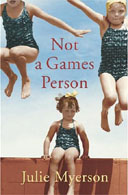
Not a Games Person
by Julie Myerson
128pp, Yellow Jersey, £10
This is a book about not liking school sports. It's therefore pretty safe to assume that a lot of people with painful memories of communal showers, itchy gym knickers and almost-invariably Welsh, moustachioed (both male and female) sports teachers will be affectionately predisposed towards it. But Not a Games Person also happens to be a wonderfully slim, toned book by the naturally and metaphorically lean Julie Myerson, who is far too smart to have written something which merely wallows miserably in 70s nostalgia and slags off games.
Just as Naomi Klein's anti-globalisation polemic No Logo became a big hit among corporate raiders and blood-sucking scumbag advertising executives, so too footie fans, hearties, rugger-buggers, golfers and in-line skaters would doubtless all find something to enjoy in Myerson's plangent reflections on the meaning of winning and losing.
Readers may already be familiar with Myerson from her handful of novels and also from Home: The Story of Everyone Who Ever Lived in Our House, a brilliant piece of high-concept non-fiction which did exactly what it said in the title. Home was the kind of beautifully simple, subtle, clever book that you might have thought of writing yourself but somehow never got round to because you were too busy working on your mind-numbingly brilliant literary novel about a chance meeting between Wittgenstein, Einstein and Oppenheimer. Myerson makes the obvious and the overlooked seem suddenly urgent and interesting - imagine a whiskerless WG Sebald minus the pretensions and the blurry little photos.
In a short book ostensibly about sack-races and swimming lessons in stinky school pools, Myerson manages to cover loss, fear, hope, anxiety and the agonies of childhood, adolescence, middle and old age. The most powerful passages in the book - which you could read in the time it would take you to go to the gym, work out, shower and get home, and which would possibly yield greater long-term cardiovascular benefits - are those in which Myerson reimagines herself as a child. "I'd like to stay at home for all my life, live there and be there and sleep in my own bed and be my Mum's helper and never have to go out into the Big Girl's World. That would be my ideal life. The life of the Ladybird Key Words Reading Scheme."
Wisely, to prevent this dashing little narratorial trick from becoming just a big hot-and-bothered bore Myerson also twists round and springs up and writes about herself as a child in the third person. She observes herself, for example, doing a jigsaw of the British Isles. "She wonders if there are schools for children who live by the sea. She imagines not. She imagines that if you're lucky enough to live on the edge then you're always going to feel holidayish and happy and free."
But in case this other, Olympian point of view becomes too grand and annoying, there's also a great messy rush of small, diverting incidental detail; Myerson knows how important it is to vary the pace and take breaks. She recalls, for example, almost as an aside, that not-too-distant past when all school staffrooms stank of smoke: "Every time the staffroom door swings open and shut, smoke billows out. If you didn't know that they all smoked then you would think the room was on fire." And she remembers girls worrying about getting pregnant from rogue sperm in swimming pools. And PE teachers saying: "Tails in, stomachs in."
Not a Games Person is also a book about Myerson's mother - who was a games person - and her father, who committed suicide, and about her grandfather, a "religious maniac" who not only thinks that "television and women with short hair are the work of the Devil", but who also hoards and collects so much junk that he ends up having to sleep outside in a caravan. These family portraits are brief and startlingly bleak - cameos really - but sketched with great care and diligence, and when Myerson interviews some of her now very elderly and not entirely sympathetic PE teachers, she manages the difficult task of portraying lives that have clearly lapsed and shrunken with wit and dignity. If you wished to discover exactly how our tiresome and inevitable preoccupation with ourselves and our own pasts can be transformed into literature, then read Julie Myerson.
· Ian Sansom's novel Ring Road is published by Harper Perennial.

